Category Archives: The Wire
Series Finales: the Good, the Bad, and the Ugly
Let’s talk about endings today. I’ve been in a bit of a fugue state since LOST concluded on Sunday night. Endings tend to be bittersweet, and this one got me mulling over the final episodes of some of my other all-time favorite shows. Fans of LOST, THE SHIELD, THE WIRE, LAW & ORDER, SEINFELD, THE SOPRANOS, and SIX FEET UNDER, here’s your warning: if you haven’t seen the final episode of these series yet, there are spoilers ahead…
I became hooked on LOST early on. Over the past six seasons it was sometimes fantastic, occasionally maddening, and always puzzling. At the moment, how to draw something to a close is a particularly relevant subject for me, since I recently finished the fourth book in my series. All of those books have primarily focused on the arc of two characters, and with this final book, that arc needed to draw to a close. Mind you, I’m not done with the series, but the focal point will shift with the next book. Because of that, I really wanted to wrap things up in a way that was ultimately satisfying (although not necessarily “happy”). It’s a challenge that most series face. Some rise to the occasion, others fall flat.
So here’s my rundown of the best and worst television series finales. Feel free to chime in on what you thought of each:
- LOST: To be honest, I didn’t have high expectations for this finale. I knew going in that there were so many dangling threads, there was simply no way the writers would be able to tie them all up. Yet I was pleasantly surprised. What I think they gave us, in the end, was viscerally satisfying. The characters that we’ve grown to care about all completed their journey, there were some nice tie-ins to incidents going all the way back to the pilot. That initial episode concluded with Jack saying, “If we can’t live together, we’ll die alone.” As it turned out, living together meant that when they did die, they weren’t alone. The finale didn’t answer every lingering question (what was the island after all? Just a giant MacGuffin?) but it managed to deliver what the show has alway
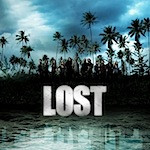 s provided in its best moments. Since the debut it was an emotional ride, focused on the characters and the journey they’ve undertaken together. It provided enough answers to give some satisfaction, while still leaving quite a bit open to debate. I suspect that if the writers had known from the outset how many episodes total they’d have to play with, it would have been a much tighter story arc. But alas, that’s not how the world of TV works. Going in, they never could have guessed what a hit the show would become, and how many slavering fans would dissect every scene. That being said, I think they did a great job. In the end the series shone a light on the true meaning of love and friendship, redemption, and mortality. Some people complained that it was mawkish and maudlin. For me, the sentimentality worked. After all, I’d spent years with these characters. I cared about what happened to them. I wanted things to work out for them- and based on my interpretation of the finale, it did.
s provided in its best moments. Since the debut it was an emotional ride, focused on the characters and the journey they’ve undertaken together. It provided enough answers to give some satisfaction, while still leaving quite a bit open to debate. I suspect that if the writers had known from the outset how many episodes total they’d have to play with, it would have been a much tighter story arc. But alas, that’s not how the world of TV works. Going in, they never could have guessed what a hit the show would become, and how many slavering fans would dissect every scene. That being said, I think they did a great job. In the end the series shone a light on the true meaning of love and friendship, redemption, and mortality. Some people complained that it was mawkish and maudlin. For me, the sentimentality worked. After all, I’d spent years with these characters. I cared about what happened to them. I wanted things to work out for them- and based on my interpretation of the finale, it did. - THE WIRE: Still, hands down, the best show ever produced for television. And the conclusion delivered. As always with this show, things weren’t tied up with a neat bow, because real life isn’t like that. But we saw the torch being passed to a younger generation, for better and for worse. We saw redemption for McNulty, justice for Daniels, and Bubs getting a new lease on life. This was probably my favorite series finale ever. Well done across the board.
- THE SHIELD: Tough one here. I loved the show from the outset for the moral gray area that all of the characters occupied. Like the WIRE, it felt more real than the vast majority of police dramas. It was never as simple as the good guys vs. the bad guys,
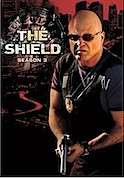 because every character possessed the capacity for both good and evil acts (even Dutch: remember him strangling that cat?) And the conclusion here was grim. In the end, Vic Mackey ended up losing his family and friends, stuck in a day job that was for him a living hell, with all of his crimes brought to light. Things didn’t really end well for most of the characters we cared about: they were either dead, in jail, or alone and isolated. It was the furthest thing from a happy ending, yet it was satisfying, because there was a sense that justice had been done, and everyone ended up paying the price for it.
because every character possessed the capacity for both good and evil acts (even Dutch: remember him strangling that cat?) And the conclusion here was grim. In the end, Vic Mackey ended up losing his family and friends, stuck in a day job that was for him a living hell, with all of his crimes brought to light. Things didn’t really end well for most of the characters we cared about: they were either dead, in jail, or alone and isolated. It was the furthest thing from a happy ending, yet it was satisfying, because there was a sense that justice had been done, and everyone ended up paying the price for it. - SIX FEET UNDER: This finale if right up there for me. The final few minutes in particular, when Claire was driving away from her family to start a new life, interspersed with flash forwards that tied in so nicely to the opening of every episode, were sheer genius. Viewers witnessed the death of every major character in a sort of time-lapse montage video: some demises were funny, others tragic or mundane. Thanks to those snapshots of their future lives, it was probably the most satisfying series ending I’ve ever seen.
- LAW & ORDER: I just watched this last night. I’m not sure if the writers were aware that this particular episode would mark the end of the second longest-running drama on television. Either way, I like that they didn’t over do it. Most of the episode was just like any other installment, although this time (interestingly enough) there was no actual homicide (and if you’re going to get picky, no real reason for Lupo and Bernard to be investigating a potential terrorist threat. But I digress). The final scene with the lieutenant was heartwarming, although the great strength of the show was that viewers were left largely unaware of the personal lives of the characters. You were treated to tantalizing tidbits here and there, but the focus always remained firmly on their work lives (this is why they were able to keep going for twenty years despite a slew of cast changes, in my opinion).
Now, on to some finales that disappointed.
- I realize that this is probably going to spark some debate, but I was one of the people who really loathed THE SOPRANOS finale. There were many far more interesting things they could have done, as opposed to that surreal, disjointed final scene in the diner (Speaking of which, if you missed the LOST alternate endings o
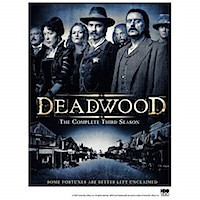 n Jimmy Kimmel, see them here. Brilliant). The writers could have gone back to the pilot, bringing back those damn ducks. They could have had that Russian finally wander back out of the woods (speaking of threads that were never tied up). While I appreciated that they ended with the family, which is largely what the show was about, I still felt let down.
n Jimmy Kimmel, see them here. Brilliant). The writers could have gone back to the pilot, bringing back those damn ducks. They could have had that Russian finally wander back out of the woods (speaking of threads that were never tied up). While I appreciated that they ended with the family, which is largely what the show was about, I still felt let down.
- SEINFELD: Terrible. Just awful. Having the characters end up in jail was absurd, and not in the trademark manner of the rest of the show. It felt forced, nasty, and just plain silly. Worse yet, there was nothing funny about it- which is downright criminal for the conclusion of one of the all-time funniest sitcoms. I have never been more disappointed by the end of a series.
- DEADWOOD: This show ended prematurely, and on a flat note thanks to some serious missteps by HBO. It’s a shame that they’ll probably never be able to get everyone together again for that hinted-at film that was supposed to make up for it. What started with a roar ended with a whimper.
So I’d love to hear what you think of these, and other shows I might have missed. Who did it well? Which finales bombed?
Why I Love My Television
So I became engaged in a heated debate the other day with a group of friends over the relative merits of television. One friend was a holdout who was caught by surprise with the recent switch to digital- she’d never owned a cable box, and didn’t care to start now. I thought that was a shame, and said so. And here’s why: Hands down, I think some of the most interesting stories are being told on television. A series opens up the possibilities of a much broader story and character arc than any film, in my opinion. Which isn’t to say that there aren’t some great movies out there, but I think some of the current TV programming beats the majority of films hands down.
Here are my favorites:
- Nurse Jackie: Granted, there have only been two episodes thus far, but wow. I have a hard time imagining a movie studio greenlighting a project like this. Edie Falco proves there’s life after Carmela Soprano, the supporting cast is great, and I can’t wait to see what happens. It’s the most caustically funny comedy out there right now.
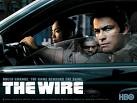 The Wire: Season after season this series paved new ground. I think it was the best police procedural ever made, and that includes Homicide, in which to be honest my interest waned halfway through.
The Wire: Season after season this series paved new ground. I think it was the best police procedural ever made, and that includes Homicide, in which to be honest my interest waned halfway through.- Deadwood: Shakespeare in the Wild West. Swearengen was one of the best villains ever written, complex, smart, funny- he stole the show season after season. It’s a shame this ended so soon.
- Mad Men: It makes one yearn for the days of three martini lunches. A brilliant portrait of life in America at a time when everything was about to change.
- United States of Tara: An Emmy is almost a given for Toni Collete in this role that allows her to chew the scenery. Roles like this for women of a ce
 rtain age just don’t exist in film anymore. And Diablo Cody proves that Juno wasn’t a fluke, she’s a major talent.
rtain age just don’t exist in film anymore. And Diablo Cody proves that Juno wasn’t a fluke, she’s a major talent.
- The Tudors: The trashiness is leavened by the period costumes and fine acting of Jonathan Rhys-Meyers.
- The Shield: Dark, gritty, and one of the best and most realistic endings to a drama ever televised.
- It’s Always Sunny in Philadelphia: This show is so weird and out there I can’t get enough of it. You so rarely see cannibalism explored in two dimensions, alongside race relations, white guilt, and character so completely devoid of any sense of humanity.
Note that all of these air on cable networks- my argument for investing in a box over an antenna. Granted, there’s a lot of trash out there, but there are some true gems as well.
So I’m curious to hear what everyone’s current favorites are- there are many I haven’t listed here that are mainstays on my TIVO, but these are the ones I rush to see when they’re on.
ADMIT IT, YOU WATCH TELEVISION
 The Kill Zone is thrilled to welcome author Jason Starr as our guest blogger today. Jason’s book THE FOLLOWER was just re-released as a mass market paperback, and I can attest that it’s a dark, funny story that absolutely everyone should read. Bret Easton Ellis said, “The Follower is Jason Starr’s masterpiece,” and The New York Times described it as “Extremely chilling.” Think of it as a dating “how not-to.”
The Kill Zone is thrilled to welcome author Jason Starr as our guest blogger today. Jason’s book THE FOLLOWER was just re-released as a mass market paperback, and I can attest that it’s a dark, funny story that absolutely everyone should read. Bret Easton Ellis said, “The Follower is Jason Starr’s masterpiece,” and The New York Times described it as “Extremely chilling.” Think of it as a dating “how not-to.”
Without further ado…
Our TV broke last week. It was an LCD set—an old model—and when the inverters go, that’s it, the set’s dead. We have a new TV now with one of the best home music systems, but for several days we were forced to go TV-less. I know, the horror, the horror, right?
Actually, going without a TV was a bit of a shock. My family and I live in a fairly small Manhattan apartment and the sudden quiet was startling. Sudden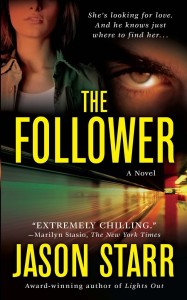 ly I felt like I was back in the 1800’s, living in the Little House on the Prairie, and I had to entertain the family at night with my fiddle. I was able to read more, which was great, but it didn’t really fill the void.
ly I felt like I was back in the 1800’s, living in the Little House on the Prairie, and I had to entertain the family at night with my fiddle. I was able to read more, which was great, but it didn’t really fill the void.
I mainly watch sports and movies on TV, and cable series such as Entourage, Dexter, and Californication. Not so-long ago there was a big stigma among people, especially writers, about admitting to television watching at all. At parties, if the subject of television came up a writer would say proudly, “I’m too busy to watch TV.” Some went further and claimed, “I don’t watch TV at all.” Others—the really busy people—would boast, “I got rid of my TV.”
I always suspected that people who claimed they didn’t watch TV were closet TV- aholics. They probably sat with their asses glued to their couches four hours a night, watching the entire lineup of the dumbest sitcoms.
But something happened, I think around the time The Sopranos got popular. Suddenly it became socially acceptable to admit to TV watching, and a big stigma to not watch TV. If you didn’t watch The Sopranos, you were considered to be some kind of freak, and if you didn’t watch the finale–fuggedaboutit. I think there’s no doubt that the quality of television in general has improved greatly over the years, but there has been a change in our attitudes toward TV as well.
Now being TV-literate, especially cable TV-literate, is much more socially acceptable, even vital. I actually feel 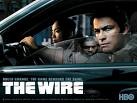 sorry for the writers who don’t watch TV because at parties and mystery conferences they’ll inevitably hear: “What, you haven’t seen every episode of The Wire? Oh my God, what’s wrong with you?…“What, you don’t watch Dexter? Really? You have no idea what you’re missing.”….“What, you’ve never seen Californication? You’re kidding me? Really?”….“You’ve never heard of The Shield?”
sorry for the writers who don’t watch TV because at parties and mystery conferences they’ll inevitably hear: “What, you haven’t seen every episode of The Wire? Oh my God, what’s wrong with you?…“What, you don’t watch Dexter? Really? You have no idea what you’re missing.”….“What, you’ve never seen Californication? You’re kidding me? Really?”….“You’ve never heard of The Shield?”
I’ve seen some television-deprived writers embellish their TV watching, smiling vaguely and nodding a lot, not wanting to feel left out when people start discussing the latest shows. That’s right, writers have now come full circle and they actually exaggerate the amount of television they watch.
So I’m wondering, how much television do you watch? And do you find that lately it’s more socially acceptable to admit it?
JASON STARR is the Barry and Anthony Award-winning nine crime novels which have been published in ten languages. His latest thriller from St. Martin’s Press, THE FOLLOWER, is on-sale this week in a new mass market paperback edition. Visit www.jasonstarr.com and sign up for Jason Starr’s newsletter for a chance to win a 50-dollar Amazon gift certificate, and other exciting prizes. Newsletter subscribers will also be eligible to win free advance copies of Jason Starr’s next thriller PANIC ATTACK, which will be on-sale in August, 2009.


